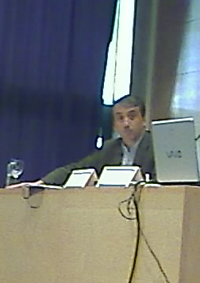The Congress on Internet, Law and Politics has the aim of continuing the task of reflecting on, analyzing and discussing the main changes taking place in law and politics in the information society. This third congress focuses on the questions that currently represent the most important challenges and new developments in the fields of copyright, data protection, Internet security, problems of responsibility, electronic voting, and the new regulation of e-Administration, as well as dedicating a specific area to the current state of the use of new technologies by law professionals.
Ramón García Albero, University of Lleida

Ramón García Albero
It looks like consensus on ethics is weakening and people more and more rely on penal law as a moral meeting core and generator of ethics. This, of course, makes law be stronger, and puts the last resource that should be penal law in the front row.
On the other hand, the Internet has broken the lapse between “thought” and “action”. Now action immediately follows thought as it is just one click away. Before the Internet, crime required time, exposure. No more now. And indeed: there are no witnesses when one commits crime at home, there’s no one blaming, no one moralizing. It’s easy to discover the beast on one’s inside
.
Investigation in Internet: International police cooperation structures
Antonio López, National Police Force inspector, Europol liaison officer, Spanish Desk
Social reproach vs. penal reproach: some people tolerate some crime because, morally, it does not seem to be that bad.
In some types of crime (i.e. child pornography) the criminal not only performs the crime at home, (almost) anonymously, etc. but, also, he or she finds virtual communities, web pages, zillions of material that, somehow, legitimate his action and, hence, makes it look as non criminal.
The problem is that yes, monitoring each and everyone affects privacy and data security, but if there is no data retention, there is no Internet crime research and/or prosecution
. On the other hand, we’re just talking about log retention, not content retention.
On the 3rd IDP Congress on Internet, Law and Politics, see also:
- Briefings, part I: Jonathan Zittrain keynote speech
- Briefings, part II: Responsibility for content on the internet: state of the art and new perspectives
- Briefings, part III: The fundamental right to data protection: perspectives
- Briefings, part V: The new frontiers of copyright
- Briefings, part VI: Electronic voting
- Briefings, part VII: The Law on e-Administration
- Briefings, part VIII: Use of technology among law professionals